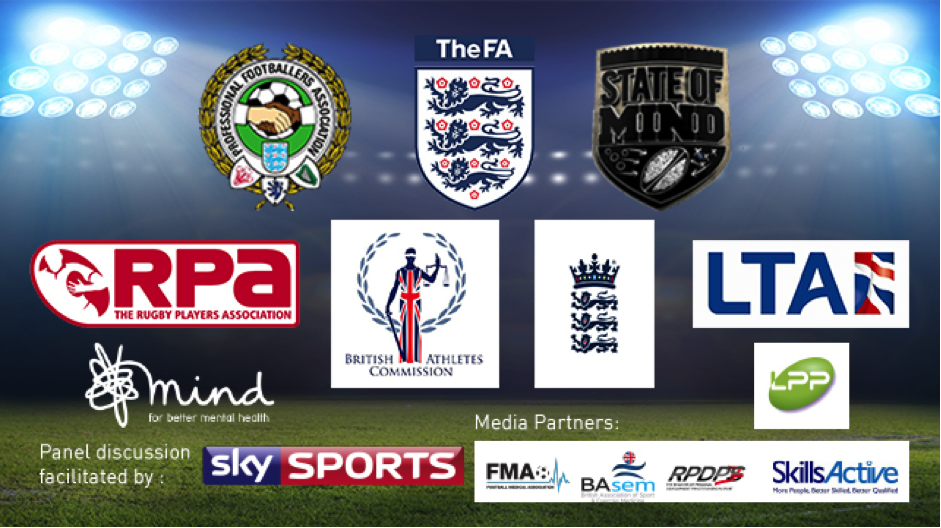Undergraduate perspective on Sports & Exercise Medicine – a BJSM blog series
By Steffan Griffin (@lifestylemedic)
The inaugural conference hosted by Maudsley Learning, gathered elite sport professionals and stakeholders to stimulate debate and conversation about a topic commonly overlooked or underestimated by those outside the game: Mental health. This topic has been a taboo subject within sport for too long. The Mental Health in Sport Conference challenged some of the preconceptions about sports people as ‘invincible’ and generated discussion about maximizing mental health and wellbeing. Here are highlights from each day’s presentations.
Introduction by Nick Pierce, Chief Medical Officer to the England and Wales Cricket Board
- Within cricket, long tours are a major issue with a high proportion of individuals succumbing to some symptoms of depression
- Risk factors include: family separation and the ruthless personal analysis and media intrusion by the press and now social media
- Seemingly more questions than answers:
- Does professional sport overly challenge wellbeing?
- How realistic is the truly resilient athlete?
- High performance needs high support!
- Need to also focus on staff and coaches as their wellbeing and positive outlook filters down to the players
The impact of high performance sports system on the athletes within it: Ian Braid
- Difficult for athletes to discuss their issues/concerns with someone who can determine their careers, which is why the British Athletes Commission was created
- Pressure comes from the ‘no compromise’ mindset of some sport institutes and from coaches who act as figures of authority, and not true leaders
- The possible consequences of pressure include a detrimental effect on performance, anxiety, stress and depression
Mental Health in football – What is it? What does it look like? Dr Ian Beasley and Michael Bennett
- Issues stem from the fact that ‘super-talents’ rarely hear the word ‘no’ which leads to problems when these same individuals eventually have to think and do things for themselves, especially the 95% in academies who are no longer part of the club by the age of 18
- There is a higher rate of mental health disorders in footballers relative to the general population
- We need 3 things more than anything within football:
- Real research into mental health incidences within elite football
- To overcome the prejudice in the game
- To ensure players are prepared for retirement where a loss of identity occurs
Workshop – Performing under pressure. Gill Deane
- Presence of stress is not necessarily pathological, however our bodies were only designed for short term stress
- Resilience is a key trait, defined as the ability to keep stress in proportion, stay focused and recover properly
- There are methods of building resilience, not many are born resilient!
- Think about your thinking – acknowledge emotions whilst harnessing executive functioning so that activating events don’t lead to negative consequences/actions
‘Every Cloud’…The psychology and management of career ending injuries. Damian Hopley and Dr Philip Hopley
- Hardest period is the first 2 years after retirement; the worst outcomes are seen in those whose retirement is determined by others/circumstance (e.g injury)
- The main issue is a loss of identity and self-esteem, characterised by a refusal to accept the issue
- The psychological issues we see in sport are the same we see in the general public, they are normal people but are in a high pressure environment with little training to cope
Mind and elite sport. Paul Farmer
- Stigma causes a silence in regard to mental health issues, which causes a vicious circle, we need people comfortable to speak about the topic and create an open environment
- Introduction to elite sport and retirement are two key transition points where proactive mental health support necessary
- We need to stress the confidential and independent nature of the services provided to athletes in order to maximise use
Pressures of an elite athlete. Danielle Brown MBE
- External sources of pressure include the media, who tend to focus on certain disciplines intensely for a short period of time, which can greatly affect the athletes if not prepared/trained
- A key issue is the mental preparation of the coaches, who need to be in the same composed mindset as the athlete, otherwise their “flapping” may adversely affect the athlete’s preparations and performance
Being a professional tennis player. Rachel Newnham
- No off-season in tennis, players will always be chasing something with life as one of the 3000 professional players requires a lot of travelling with little guaranteed income and low support
********************************
Steffan Griffin is a third year medical student at the University of Birmingham currently intercalating at Cardiff Metropolitan University in Sports Science. As an ambassador for Move.Eat.Treat and the president of the Birmingham University Sport and Exercise Medicine Society (BUSEMS), he is passionate about the role of exercise as a proactive healthcare tool. He is involved with the Undergraduate Sports & Exercise Medicine Society (USEMS) committee as the Conference Officer. He combines a passion for all things SEM related with an avid interest in sport, and tries to live as active a life as possible.
Dr. Liam West BSc (Hons) MBBCh PGCert SEM (@Liam_West) is a graduate of Cardiff Medical School and now works as a junior doctor at the John Radcliffe Hospital, Oxford. In addition to his role as an associate editor for BJSM he coordinates the “Undergraduate Perspective on Sports & Exercise Medicine” Blog Series.
If you would like to contribute to the “Undergraduate Perspective on Sports & Exercise Medicine” Blog Series please email LIAMWESTSEM@HOTMAIL.CO.UK for further information.
